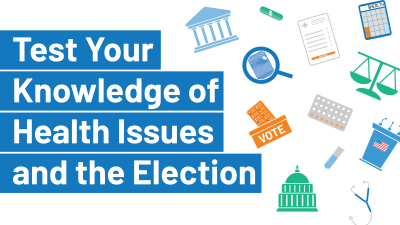 Health Issues and the Election Quiz
Quiz
Health Issues and the Election Quiz
Quiz
Test your knowledge about health facts, policy issues and proposals that are emerging among the 2020 presidential candidates. The 10 questions focus on health issues in the 2020 election, including: health care costs, prescription drug prices, the Affordable Care Act and changes in health insurance coverage, reproductive health, and Medicare-for-all and public option proposals.